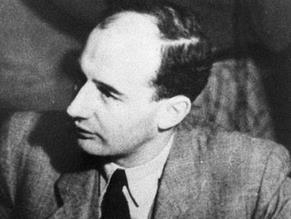|
World Jewish News

According to some authorities, Raoul Wallenberg saved as many as 100,000 lives.
|
Sweden remembers Holocaust hero Raoul Wallenberg
02.08.2012, Holocaust Sweden on Saturday celebrates 100 years since the birth of diplomat Raoul Wallenberg, who saved tens of thousands of Hungarian Jews from the Holocaust before vanishing into Soviet custody.
Crown Princess Victoria and Education Minister Jan Bjoerklund will be among the dignitaries attending a ceremony Saturday organised by the Raoul Wallenberg Academy in Sigtuna, a suburb of Stockholm.
Wallenberg's achievements during the closing years of World War II have been recognised not just in Sweden, but also abroad. Canada, Israel and the United States have all awarded him honorary citizenship.
"Raoul Wallenberg fought against one of the terror dictatorships of his time, and was killed by the other," says a foreign ministry website set up to mark the centenary of his birth.
But his home country carries the burden of having failed to save him from the Soviets when they had the chance.
Wallenberg was born near Stockholm on August 4, 1912 into one of the richest families in Sweden.
He trained as an architect in the United States and until the war years, was just a young businessman travelling between South Africa, Sweden, Hungary and what was then Palestine.
Then in June 1944 the War Refugee Board, set up by US president Franklin D. Roosevelt, appointed him to work in the Hungarian capital Budapest, leading a mission to try to save as many Jews as possible.
The Board's work to save civilian victims of the Nazis involved providing them with identity documents from neutral countries such as Switzerland, Turkey -- and Sweden.
Wallenberg joined the Swedish delegation in Budapest where, since the spring of 1944, officials had started providing Hungarian Jews threatened with deportation to Nazi death camps with "protective" passports.
Wallenberg put a bold but simple plan into action: he issued more and more protective passports to Jews and housed them in buildings bought by Sweden and declared Swedish territory.
These passports were little more than a piece of paper decorated with the three golden crowns of Sweden's coat of arms; the diplomatic status of the improvised safe houses was bolstered by little more than a Swedish flag.
But his plan worked: thanks in no small part to a unique blend of charisma and chutzpah, Wallenberg managed to get 20,000 people into these sanctuaries and convince the authorities they were Swedish citizens.
"It was bluff," Professor Paul Levine, the author of a book about
Wallenberg, told Swedish radio. But the Nazis and their allies respected it, he added.
Wallenberg went about organising the escape of the Jews, entering into direct negotiations with the Nazi authorities. According to some authorities, he saved as many as 100,000 lives.
On January 17, 1945 according to several witnesses, Wallenberg left
Budapest headed for the eastern city of Debrecen, where the advancing Soviet forces had already set up their headquarters.
It was there that he vanished from view.
When the Swedish authorities finally did make inquiries about him, the Soviets said they had arrested him, but did not explain why. Yet Stockholm failed to put pressure on Moscow to obtain his release.
This "deplorable passivity" might well have done real harm to Wallenberg between 1945 and 1952, Olle Waestberg of Sweden's foreign ministry told AFP. Waestberg is coordinating this year's centenary events.
The Swedish authorities formally presented their apologies to his family in 2003 after a foreign ministry report condemned the then government's failure to act.
Wallenberg had become a victim of the Cold War: his mission had been set up by a US agency and Sweden, in the post-war years, was keen to build economic ties with the Soviet Union.
It was only after the death of Soviet dictator Joseph Stalin in 1953 that Stockholm began to press the Soviets for more information about Wallenberg: but in vain.
"We can't establish with certainty when Raoul Wallenberg died," diplomat Hans Magnusson, who led a joint Swedish-Russian inquiry into the affair, told AFP.
"The Russians say that it was July 17, 1947, but do not rule out that he could have lived longer. Documents have been destroyed," he added.
by: Camille Bas-Wohlert
EJP
|
|
